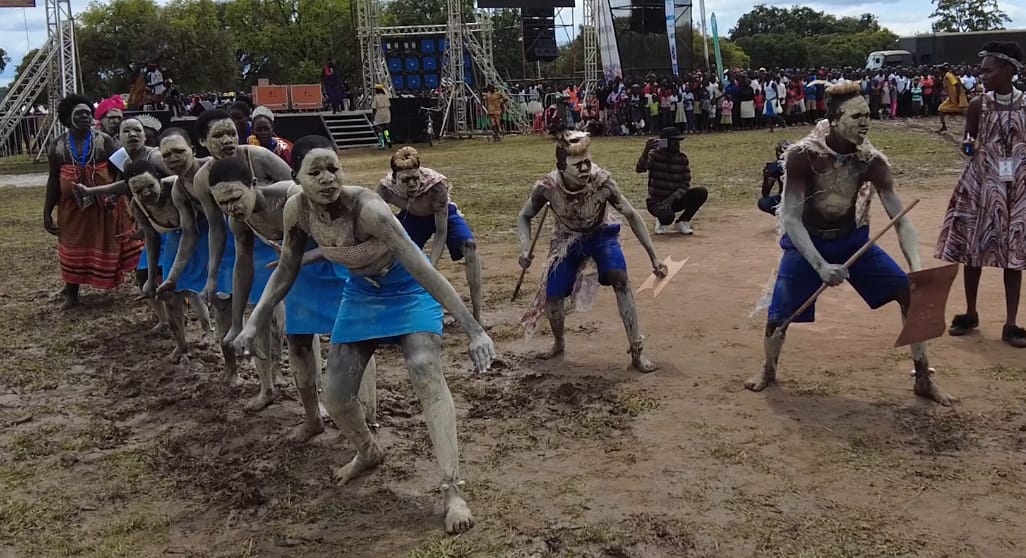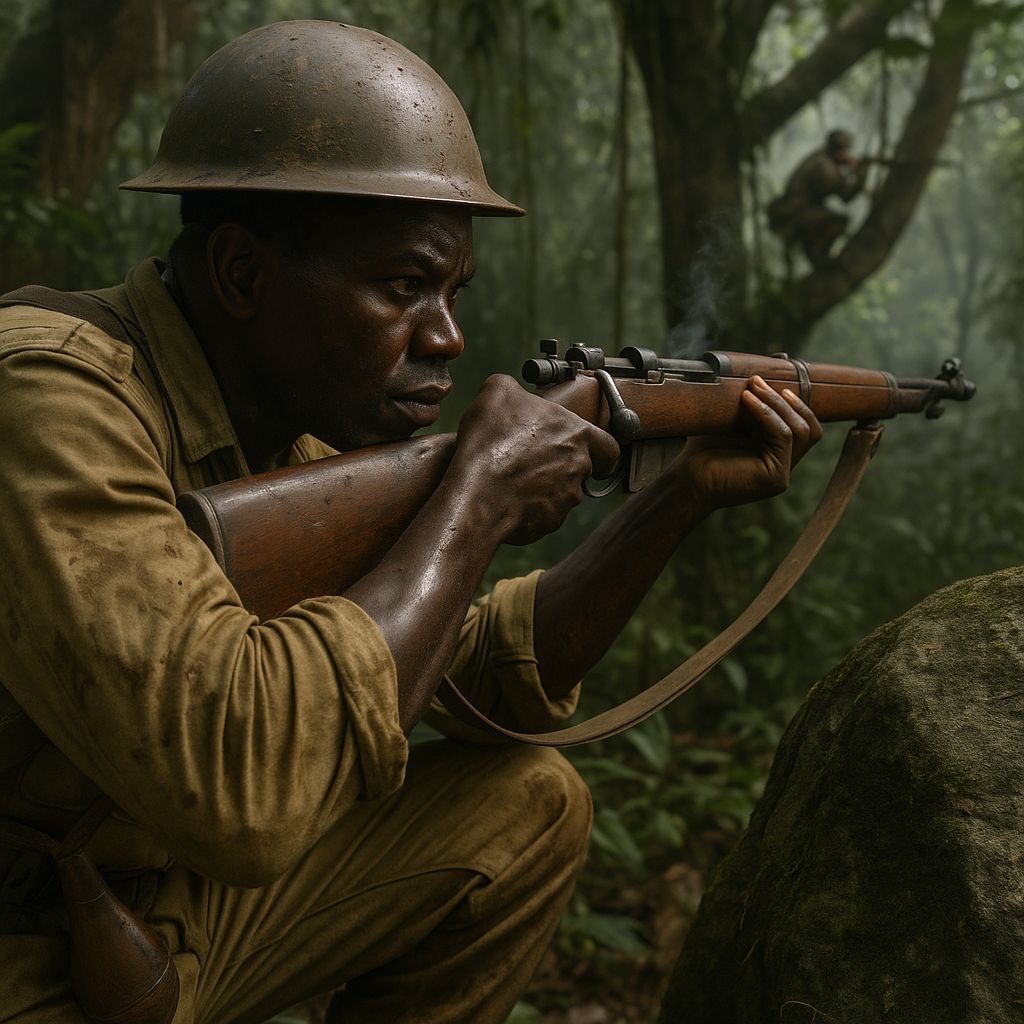- Ongwen Laodog
- Posts
- Not Your Normal News From Lango (May. 2025)
Not Your Normal News From Lango (May. 2025)
Ongwen Laodog


Ongwen Laodog (Not Your Normal Newsman)
SPEAKING LEBLANGO AT A GATHERING CAN MAKE YOU SOUND WELL-READ AND INTELLIGENT - THIS IS HOW!

Lango youths ready themselves for the Kiri dance
Yes, it can—and here’s how to pull it off.
You see, Leblango (by the way, that’s the correct way of writing it—not “Leb Lango,” and definitely not “Lango Language”) is one of the least known dialects in Uganda. As a national language, it is overshadowed by more prominent ones like Luganda. As a Luo dialect, it’s eclipsed by Lebacholi.
You might think this puts it at a disadvantage—and you’re probably right. It doesn’t help that many Leblango speakers aren’t proud of it. A group of Leblango speakers may gather and still choose to speak English instead. Look at us: you’re likely a Leblango speaker, otherwise you wouldn’t be reading this, and yet I’m writing to you in English. Sad, isn’t it?
But don’t lose hope. Because it’s so “hidden,” Leblango qualifies as an exotic dialect. This gives it power—you can use it at events to impress people and come across as well-read and intelligent.
I did just that recently at a fundraising event. People were taking turns to stand and announce their contributions. When my turn came, I stood up, rubbed my stomach like a man of means, and declared:
“Ha… apwo oryong lung ame owinyo duru ame Aryong Adwong okuku eka te ringo kun ikelo gi-cing wu me toro te iryonget wa ni. Gabipiny ngul lao acil ikong wu! Ah… rok Lango okobo ni ‘pot yat oony kede wad gi.’ En omio an dang akelo gi cinga moro adunu me wek anywak ked wu. Aran, co moro ame Gabipiny omio ni. Welere tye tol-gagi pyer atomoro wie kany!”
I mostly did it for fun, but it earned me chuckles, applause, and later, praise from a few people.
Truth is, a neglected dialect like Leblango can elevate your presence. Here are a few practical ways to use it to enhance your speech and sound intelligent:
1. Learn Some Wise Sayings and Proverbs
Be a collector of rare proverbs, idioms, and figures of speech. Common sayings are fine, but obscure ones stand out. In my speech above, I used “pot yat ony kede wad gi” because it's rarely used in everyday speech. The more unusual, the better.
Here are seven ‘exotic’ Leblango proverbs you can add to your library:
“Adwong pe loko lao inge nono.” — Take elders’ warnings seriously.
“Apwo titidi ento nywalo rudi.” — Don’t underestimate someone based on size.
“Kec owoto imir iyi pi.” — Step out of your comfort zone because at some point you will be forced to.
“Kucu-kucu omio lwangi oto icak.” — Even good things can bring trouble.
“Kwon kal ngeye ingwece.” — You recognize value when you see it.
“Okile a dano adit, ngat adit aye omo.” — Let experts handle serious matters.
“Lum inget pace en awngo ot.” — Familiar people or things can betray you.
Avoid misattributing proverbs. For example, “Where two elephants fight, the grass suffers” is not a Lango proverb—it’s Chinese. A mistake like that can hurt your credibility.
2. Be Short and Succinct
Especially if you're not the main speaker, keep it brief. Well-read people don’t ramble. Use one strong proverb or metaphor and explain it clearly—then exit the stage.
3. Incorporate Stories
Stories are memorable. Sadly, many people avoid storytelling in formal settings. But the best speeches include stories—especially from your own culture.
Tell the story of Abili Obangkwon and how he defended Lango. Or how Daudi Odora tricked Churchill into giving him guns. Or about the Adwari Massacre of 1919. Many have never heard these stories—even among the Lango themselves.
4. Be a Soaker of All Things Lango
To sound well-read, you must read. Start small: one chapter a week. Make it a habit. No exams, no pressure.
Start with:
Lango: A Nilotic People by Driberg (Awangemola)
Colonial Administration in Lango by Tosh
Then read:Lango Ikare Acon by Bishop Tarantino
The Bicentenary by JP Odwe
5. "Won ngec pe yele" — Keep It Simple
Don’t bombard people with obscure words without explanation. That doesn’t make you sound smart—it makes you sound pompous. Use powerful expressions, but explain them simply.
6. Use Cultural References
If speaking to non-Lango, mention things like:
“In Lango culture, women weren’t allowed to eat chicken. I know it sounds like male chauvinism, but it’s deeper than that. Give me five minutes and I’ll explain how that rule actually offers a solution to today’s challenge…”
This captures attention and makes you look wise.
7. Use Historical and Cultural Allusions
Cultural allusions connect your message to powerful ideas from Lango history and identity.
Examples:
“This is modern-day tweyo lao.” (Then explain it)
“We are dealing with woto man gwok or nyono man Obot iping…”
“This feels like another gamo Lira moment.”
These deepen your message and make your audience remember your words.
Conclusion
You don’t need to be a professor to sound intelligent. You just need to care deeply about your roots. Leblango is not just a dialect—it’s a treasure chest of wisdom, stories, and insight waiting to be rediscovered.
So next time you're called upon to speak, don’t hide your heritage. Tap into it. Speak Leblango. Use a proverb. Tell a forgotten story. And watch how you light up the room.
Ocen Iguli: Uganda’s Forgotten Hero of World War II

This is an AI image representation of Ocen Iguli in the Burmese jungle
The Second World War is in high gear. Somewhere in the jungles of Burma (now Myanmar), about ten men take positions behind rocks while others seek cover in ancient ditches carved by nature in this rugged, mountainous terrain. Burma, part of the Eastern Himalayas and Arakan Yoma ranges, is one of the most challenging battlegrounds imaginable—wild, harsh, and teeming with danger. If you miss the snakes, you won’t miss the mosquitoes.
A section of the British military, clad in their trademark World War II uniforms, is on high alert. The group, composed mostly of East African soldiers, has been forced to retreat to this sheltered jungle spot after coming under sniper fire from Japanese forces. Their commander frantically tries to reach his superiors by radio, but without success. The towering mountains must be blocking the signal.
They are on a mission—what kind, only their commander, a white corporal, seems to know. Fifteen minutes earlier, they had attempted to use a mountain pass to reach the other side but were ambushed by a Japanese sniper. One soldier, a private, was killed, and now the rest are pinned down, waiting for fresh orders. With the radio silent, they might be stuck there for a long time.
Most of the men are from the King’s African Rifles (KAR). Two of them—Lance Corporal Ocen Iguli and another private whose name remains unknown—hail from Lango.
Fifteen minutes turn into an hour, then six. Still no communication. As the sun begins to set, Lance Corporal Ocen approaches the Corporal with a plan. He asks to execute it alone. But the corporal refuses, saying such a decision can only come from the platoon commander, not from him as a section leader.
The corporal’s caution is understandable. Let’s rewind for a moment.
The Japanese invaded Burma in 1942, forcing a British retreat. In response, the Allies launched a massive counteroffensive—the Burma Campaign of 1944–1945—led by Supreme Allied Commander Louis Mountbatten. The campaign, fought by British Commonwealth, Chinese, and American forces against Japan, Thailand, and the Indian National Army, was grueling. Uganda, through the KAR, contributed soldiers to this effort. They endured brutal jungle fighting, treacherous terrain, disease, and heavy casualties. The Allies lost about 22,000 men; the Japanese about 30,000.
In this moment, however, the war rages on. Orders from above caution field commanders against needless risks. African soldiers, once treated as cannon fodder and sent on near-suicidal missions, are now to be preserved unless the mission is deemed critical.
The corporal doesn’t know how many Japanese are out there or how prepared they are. Is this mission worth more lives? He’s hesitant to move without orders.
So, when LC Ocen presents a plan that sounds like a provocation, the corporal refuses. It sounds too risky.
Who was Lance Corporal Ocen Iguli?
Ocen Yokana hailed from Amilo in presen day Apac district. He belongs to the Otengoro Olang clan. He was the father of Major Kamara, a UNLA officer remembered by many from Lango as the commanding officer of Lira Barracks during the 1995 coup in Uganda. He is also the grandfather of a well-known Lira car washer called Ocen Japan. I will tell you in a minute why he is called Japan.
Before joining the KAR, Ocen served as a colonial game ranger—Otuci in Leblango. These rangers were tasked with shooting stray wild animals, as conservation policies had not yet been established. Ocen Yokana, spending his days hunting, became an exceptional marksman.
When the British began recruiting soldiers in Lango in 1944, Ocen joined. Due to his firearm skills and leadership from his ranger days, he was promoted to Lance Corporal.
Though he was supposed to stay in Nairobi because his commanders recognizing his value, Ocen defied orders. He sneaked to Mombasa hoping to also sneak onto a ship headed for Burma. Only during final screening was his presence noticed. It was too late to turn back, so he was allowed to proceed. That’s how Ocen found himself here, in this sniper-plagued jungle.
LC Ocen had confidence in his skills. His plan? Sneak alone to a vantage point he had identified and take out the Japanese sniper.
“I’ll be cautious. They won’t notice me,” he told the corporal. “Once I spot the sniper, I’ll shoot. I’ve shot smaller animals from farther distances.”
Still, the corporal refused. “What if we provoke the Japanese? What if they respond with an all-out assault?”
But supplies were running low—especially food and medicine. With no communication and options dwindling, the corporal reconsidered. He called in the other Lango private, asking how good Ocen really was. The private had nothing but praise, citing Ocen’s skills as a game ranger. Reluctantly, the corporal approved the mission.
Under cover of night, LC Ocen crept through the rocks and jungle. He spent more time observing than he did moving. He found a hidden spot among boulders and thick underbrush. At dawn, he observed the valley below, mapping it in his mind. He watched the sniper’s suspected position for hours. Then he saw movement—a man climbing down from a tree. Then he noticed that there is a second one too climbing up to take the place of the first one. These Japanese were taking turns on sentry duty.
Ocen waited, meanwhile learning their patterns. How long one would take up there before the other one replaces him.
Now he was ready. He wasn’t delusional as he knew the risk: one missed shot could mean death for himself as the Japanese sniper would most likely be the one to fire the next shot. His weapon: the Lee-Enfield rifle. A favorite on his. Lee-Enfield was one of the state of the art rifles at that time. It was an accurate rifle, with a bolt-action mechanism that allowed fast reloading. Ocen had used this gun thousands of times. It felt like part of him.
The valley in front of him was quiet, bathed in mid-morning light. Ocen aimed at the sniper. The sniper was 200–300 yards away—far, but within his range. He took a breath, held it, and fired.
The shot shattered the stillness of the jungle. Birds scattered, monkeys fled as the Japanese sniper fell from the tree like the dead meat he was. Ocen reloaded instantly, ready for a second shot. His heart raced and you could hear it.
The Lee-Enfield rifle might have been the rifle of choice by the British snipers but bullets of that time had one drawback. Once fired, they would produce a lot of smoke. So when Ocen fired his round, his position was momentarily exposed by the cloud of smoke from his rifle. This made his heart race even faster. “What if there is another sniper somewhere else that I have not spotted?” He thought to himself.
If the Japanese had weaknesses, cowardice wasn’t one of them. They were known for their daring moves. Without giving it a second thought, the second Japanese sniper immediately climbed the same tree as fast as he could. Ocen saw it all while struggling to remain calm and focused. The ‘stupid’ smoke from the first bullet was taking ages to clear. He had a dilemma to solve and solve quickly. Should he fire now when the Japanese is climbing? But that is risky as it is harder to shoot a moving target. And missing would mean more thick smoke over and around him. Or should he wait for him to reach the spot he is aiming at? But that would also mean having the real possibility of the Japanese to be the one to fire the first shot as the smoke had already given out his location?
He opted for the later. Just as the second sniper was beginning to settle and look for where the bullet that shot his colleague came from, Ocen let out another shot. Just as the first one, it echoed through the mountains ominously fading away. Ocen was sure he got him but something wasn’t right. Why was he not falling from the tree like the first one? Was he aiming his gun back at him? But just as he was beginning to shrink his poster to hide behind a rock, he saw him fall from the tree. “Lyer,” he swore in Leblango. “Amake.” he muttered to himself in Leblango—“Got him!”
He stayed hidden, observing for another hour, scanning for other threats.
Back at camp, his comrades heard the familiar crack of the Lee-Enfield. Not Japanese Arisaka rifles. But was it good news or bad?
Then they heard a horn. “That’s Omara’s horn!” the other Lango private shouted. In Leblango, the horn blast meant: Acebo le na—“I have speared my game.” He was calling them to move.
When the war was over, Ocen returned to Uganda a war hero. He was praised and decorated for his bravery and made sub-county chief—a significant honor at that time.
So how did he get the nickname “Iguli”?
As Jago of Ibuje, Ocen was strict about outlawing the local crude gin known as Iguli. He jailed those who brewed, sold, or drank it. Locals began calling him Iguli—the man who fought the iguli gin.
Ocen is said to have told this story to all and anyone who cared to listen. He even named one of his grandsons “Japan” to remember this pivotal momnent for him. Ask any car owner in Lira city and he or she probably knows a man called Japan who is a very good car washer. That’s the Ocen’s grandson am talking about.
NB
Am still investigating this piece of oral history on Ocen Iguli. So the story above might contain some inaccuracies. Please take note of that.
Yellow Shops and Drunk Rappers: The Origins of Lira’s Newest Slangs

Alabalaba shop on Kwania road in Lira City
Since the last time I wrote about the oldest and the current trendiest slangs on Lira streets, I’ve noticed a few more that have emerged. However, at least one of them already seems to be struggling to catch on.
Neko Wic
This one came to my attention late last year (2024). I had heard it a few times but didn’t pay much attention—until I heard a radio preacher mention it again while talking about how some heads of families “switch off their heads” and simply decide to do nothing, even as their households drift astray.
Its origin appears to come from phone usage. When someone is feeling overwhelmed or stressed, they might switch off their phone to avoid calls or messages. It seems someone borrowed that idea and applied it to the brain. The implication is that, just like you can switch off your phone, one can “switch off their head” and zone out of responsibilities or reality.
Labo
This one finally triggered my curiosity when I saw a friend of mine driving a different car from the one he usually uses. I asked him, “Chikumi tye kwene?” (Chikumi is a Luganda nickname given to any Toyota Corolla model from around 1990.)
“Alabo oko!” was his response.
“Labo” is a Lango word that means selling something for way less than its actual value. Still in that spirit—let’s say you found your neighbour’s child playing in the mud, and you picked the child up, cleaned them, dressed them in fresh clothes, and took them back home. The mother might ask:
“Inwonge ikwene?”
You might respond: “Anwongo tye atuku icoto, ate labo alaba.”
Although not commonly used in everyday speech, “labo” has always existed in Leblango. So why has it suddenly become one of the most popular street slangs in Lango? I can only guess, but I think it’s a pretty good guess.
There’s a well-known phone shop along Kwania Road called Alabalaba Enterprises. If it’s been a while since you were last in Lira City, this shop is located opposite the building that used to house the Cooperative Bank branch in Lira. You can’t miss it. One, because of its bright yellow color. Two, because of the massive ALABALABA signage. But most importantly, three—because of the loud recorded audio that constantly blares from the shop. It goes something like ……
This shop has been around for a little over five years. It was among the first to start playing pre-recorded advertisements from a loudspeaker placed outside the shop. That trend is now common—annoyingly so.
I’m almost certain that this recorded advertisement is where the slang “labo” got its second wind from.
Umat ka Kongo
In 2023, a video circulated on social media of a drunken Lango woman rapping quite impressively.
Her rap went something like:
“Iya i Kampala
Ite bino naka Apala
Ite mito coba kede pala...
Oma atamo ni amat ka Kongo.
Wek amat ka Kongo.”
This video is what I believe popularised the slang “omat ka Kongo.” Of all the slangs mentioned above, this one is my personal favourite. It usually comes up in conversations when someone makes an impossible or complicated idea sound very simple or effortless. You could respond with, “Omat ka Kongo—it's what we’re good at.”
For example, someone might say:
“Bobi Wine alanyo kwir oko. Lono tye kede cwak adwong tutwal.”
And another could respond:
“Umat ka Kongo.”
It’s acceptable even if you’re not drinking at that moment—or even if you don’t drink at all.
Sadly, this particular slang doesn’t seem to be catching on very well. I personally would have loved to see it go mainstream—although I don’t drink myself.
Icina Ikom Apwo Gin Kede Nyanyang

Rik con, Nyang obin olwongo apwo ni bin lime. Nino ame ociko te romo, Apwo dang te wot. Nyang gin kede dako mere te gwoko Apwo aber meicel. Gin otede cem adit Apwo te came te yeng ni king.
Ikare ame galo wang dong ocek, Apwo te penyo Nyang gin kede cege mere ni, “Wun itye wun ario keken ni, otimo wu kono?
Nyang te gamo ni “Wan Nyanyang pe onywal. Wan obolo tong wa”. Apwo te gamo ni “Aten?” Nyang ni “ateni”.
Apwo te penyo ni “Kara tong wu tye kwene kong awot anen?”
Nyang te gamo ni, “tong wa tye iyi dero”. “Bin iwot inen ka itamo ni abwoli”.
Apwo te yito iyi dero te nwongo tong nyang tye gin tomon twal (apar). Apwo te neno ni tong Nyang neno mwonya me icel. Apwo te cako camo tong Nyang oko.
Nyang ikare ame oneno ni Apwo ori aria iyi dero, en te cako geco oko ni kare okene Apwo tye amoko tonge. En to redo kun kobi Apwo ni, “kur imok tong wa aba”.
Apwo te redo iyi dero ni “atye akwano ka wel tong wu. An gita mom atye amoko tong wu”. Ka itamo ni atye amoko tongi, wek akwani wel gi me wek inang ni tong wu kara tye ducu.
Apwo onwongo dong omoko tong Nyang ducu odong ka acel keken. Apwo te cako ting tong nyang acel odong ca mali kun kwano ni “Acel, ario, adek….. kun en tingo tong Nyang acel ca malo dok te dwoko ping. Dok otinong en tong Nyang acel laca ni ario, dok odwoko piny. Dok otino en acel lono ni adek. En omede timo amano naka te tunu iyi apar.
Cuny nyang te gony oko ni tonge karat tye gite ducu. Apwo kara kite ber nen mom ocamo moro akadi acel.
Apwo te yito piny iyi dero. Ikare ame en oyito piny, en te kwayo nyang ni byele iyonge dwoko paco pien Apwo ture tye iyonge nam tungca. Nyang te temo cere ni Apwo kong gite bed anonok te dong dok. Ento Apwo onwong tye abunyre abunya. Nyang dang dong te ye gite me byle ngole kede nam.
Ikare ame gin dong otuno iciny nam, min ot a Nyang to yito idero me wot roto tongi. En te nwong tong gi tye odong acel keken. En okene mere, Apwo omoko oko lung. Min ot a Nyang te yito oko iyi dero me oyot oyot. En te wot cung idog nam kun wero ni;
Nyang-Nyang-Nyang bol Apwo ipi, Apwo omoko tongi,
Nyang-Nyang-Nyang bol Apwo ipi, Apwo omoko tongi,
Nyang kworo mere ye, Apwo omoko tongi
Nyang kworo mere ye, Aka ka mere kot obino,
Nyang ikare ame owinyo wer a dako mere, te penyo Apwo ni, “min oda tye awer ningo?”
Apwo te gamo ni, “Min odi tye awer ni ibuny tera me oyot oyot, kot tye obino”
Nyang ka owinyo amano te medo cipid. Ento min ode pwod dok te mede iwer.
Nyang-Nyang-Nyang bol Apwo ipi, Apwo omoko tongi,
Nyang-Nyang-Nyang bol Apwo ipi, Apwo omoko tongi,
Nyang kworo mere ye, Apwo omoko tongi
Nyang kworo mere ye, Aka ka mere kot obino,
Nyang pwod te mede iwinyo. Endok te penyo Apwo ni “ento itye iwinyo aber wer a min oda ca. Tye awer ni ngo kong?”
Apwo dok ogamo ni, “en tye akobo ni itye ingwec momon. Ni imed cipid pien kot dong tye abino ame cok cwe.
Nyang kare ame owinyo amono, te dok medo cipid akato me nama acel ca oko.
Ikare ame gin otuno iloka nam, Apwo te pye inge Nyang ni ceny. Teki pye iwitela, Apwo te cako nyaro Nyang ni “Anyanya mere amoko tongi do, amoko tongi do. Anyanya mere amoko tongi do”
Nyanyang ikare ame odok paco ture te nowong ni apwo kara omoko tonge oko ducu, en yie to wang amon twere.
Icina na te gik kakan!
Ongwen Laodog
email: [email protected]
Whatsapp: +256751227228
Mobile: +256785345614